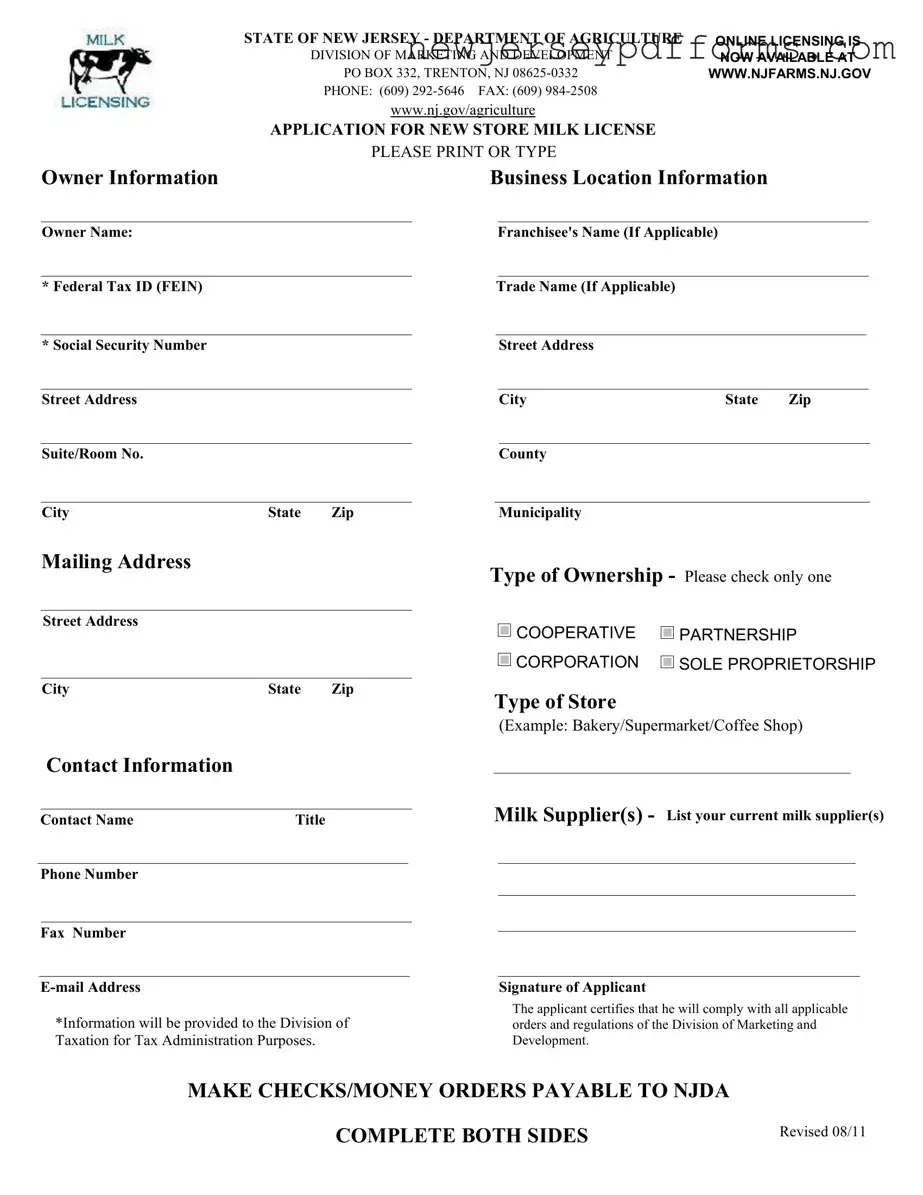The New Jersey Milk License form shares similarities with a Food Establishment License application. Both documents require detailed information about the business owner and the location of the operation. They also necessitate compliance with health and safety regulations. Like the milk license, the food establishment license includes fees based on the type of business and its size, ensuring that the establishment meets local health codes. This license is essential for any business that prepares or serves food to the public, emphasizing the importance of maintaining safe food handling practices.
Another comparable document is the Business License application. This form is crucial for any entity wishing to operate legally within a municipality. Similar to the milk license, it collects owner information, business location details, and the type of ownership. The business license ensures that the business complies with local regulations and zoning laws. Fees may vary based on the business type and size, much like the tiered fee structure seen in the milk licensing process.
The Dairy Farm License application is also akin to the New Jersey Milk License. This document is specifically for dairy farms and requires information about the farm's operations and ownership. Both licenses aim to regulate the dairy industry, ensuring that milk production meets safety standards. They require applicants to provide details about their suppliers and operational practices, reinforcing the importance of quality control in dairy products.
The Retail Food License is another similar document. It is necessary for businesses that sell food directly to consumers, including grocery stores and markets. Like the milk license, it requires detailed information about the business and its owners. The retail food license ensures that businesses comply with health regulations, similar to the compliance requirements in the milk licensing process. Fees are often determined by the size and type of store, reflecting the tiered approach seen in milk licensing fees.
The Wholesale Food License is relevant for businesses that distribute food products to retailers or other businesses. This document, much like the milk license, requires detailed owner and operational information. Both licenses emphasize compliance with health and safety standards to protect consumers. The wholesale food license may involve different fee structures based on the volume of products distributed, paralleling the milk license's volume-based fee system.
In Pennsylvania, ensuring a seamless vehicle ownership transfer is crucial, underscoring the necessity for legal documentation such as the Motor Vehicle Bill of Sale. This essential form not only validates the purchase but also captures key details regarding the vehicle and the parties involved in the transaction. For those seeking a streamlined process, resources like the PDF Document Service can be invaluable in obtaining properly formatted documents to facilitate this important step.
The Liquor License application is another document that bears resemblance to the New Jersey Milk License. It also requires detailed information about the business and its ownership structure. Both licenses are essential for regulatory compliance in their respective industries. The liquor license application includes fees that vary based on the type of establishment and the volume of alcohol sold, similar to the tiered fee structure for milk licenses.
The Certificate of Occupancy is similar in that it verifies that a building is safe for use and complies with zoning laws. While it does not focus specifically on food or dairy products, it is a necessary document for any business, including those applying for a milk license. Both documents ensure that the business operates within legal parameters and meets safety standards, reinforcing the importance of regulatory compliance.
The Sales Tax Permit is another document that parallels the New Jersey Milk License. Businesses must obtain this permit to collect sales tax from customers. Like the milk license, it requires information about the business and its owners. Both documents are essential for legal operation and compliance with state regulations. The sales tax permit emphasizes the responsibility of businesses to collect and remit taxes, similar to how milk license holders must comply with specific industry regulations.
Finally, the Health Permit is essential for any business that serves food or beverages. This document is crucial for ensuring that businesses meet health and safety standards. Similar to the milk license, the health permit requires detailed information about the business and its operations. Both documents aim to protect public health by enforcing compliance with safety regulations, highlighting the shared goal of maintaining high standards in food and beverage industries.

